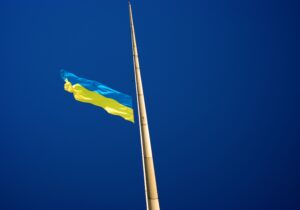The Middle East Institute recently held a conference discussing how Russia’s invasion of Ukraine affects Turkey, featuring speakers Alper Coşkun, General (Ret.) Philip Breedlove, and Serhat Güvenç. Turkey’s geopolitical position has become precarious since the Russian invasion of Ukraine, delicately balancing its Western obligations with its desire to preserve its tenuous relationship with Russia. Events have compromised Ankara’s typical role as a mediator between the West and Russia. Turkey’s future in the region is uncertain, but there is hope that Russia’s geopolitical revisionism will drive Ankara closer to its Western allies.
Coşkun commented that Russia and Turkey have not historically had a cordial relationship, and their current alignment has been one of mutual interdependence favoring Russia. Galip Dalay, a fellow at the German Institute for International and Security Affairs (Stiftung Wissenschaft und Politik), notes that the Ottoman and Russian empires fought 13 wars and that its recent “geo-political balancing policy is a break with tradition, a rare experiment.” Russia briefly assisted Turkey during its war for independence (from around 1919 to 1936), providing financial assistance and returning three provinces. This “early balancing policy” largely ended with the 1936 Montreux Convention which granted Turkey control over the Bosporus and Dardanelles Straits.
Russia and Turkey’s tenuous cooperation has slowly emerged over the last several decades largely due to their shared Western disillusionment. Mehmet Bardakçı for the publisher De Gruyter notes that Turkey first approached the Soviet Union around 1964–79 while experiencing a deteriorating relationship with the West as a result of the Cyprus conflict. It is important to understand that Turkey and Russia’s anti-Westernism is not driven by the same concerns. Dalay details that Turkish anti-Westernism tends toward being “selective and policy-focused” while Russian anti-Westernism is “structural and encompassing.” Delay proceeds to note that Russia is developing “civilizational and value-driven language,” and that Turkey tends to avoid this sort of rhetoric. Russia’s disillusionment with the West is deeply rooted in its ideological identity and is thus existential in its character. Turkey’s disillusionment with the West is largely self-interested and pragmatic.
Security concerns largely drive Ankara’s desire to maintain a relationship with Russia. Since 2011, Western policy in Syria has refused to counter the Kurds, including the People’s Protection Units (YPG) and the Kurdistan Workers’ Party (PKK), which has aggravated Turkish President Recep Tayyip Erdoğan. While Russia also sides with the Kurds, Moira Goff-Taylor for the Wilson Center comments that Russia’s position as a dominant force in the region spurred Erdoğan’s cooperation with Moscow. Erdoğan is perhaps clinging to the hope that if Turkey maintains close relations, it will be able to influence Moscow’s directives in Syria.
Turkey has also drifted toward Russia because it seeks independence from the West. Ankara sees that Western supremacy may be declining in favor of a multi-polar world order, making it more important for Erdoğan to align himself not with European nations but with the dominant force in his region. The West increasingly pesters Turkey about human rights violations, including how it violates the rights of religious minorities, such as Christians. Russia serves as a counterweight against this unwanted attention. Güvenç commented during MEI’s conference that Ankara does not yet share the perceptions of its allies in seeing Russia as a threat. Unless this changes, Turkey will see Russian superiority in the region as beneficial for its independence from the West.
Finally, Turkey aligns with Russia because of economic concerns. Coşkun noted during the conference that Russia’s invasion of Ukraine is the worst thing that could have happened as far as Turkey is concerned. The world saw the strength of Russia’s grip on the Turkish economy when, in November 2015, Turkey shot down a Russian Su-24 bomber that flew into Turkish national airspace. As Goff-Taylor notes, Russia responded via sweeping sanctions along with other economic measures and Turkey experienced a severe economic setback. Russia did not loosen these sanctions until 2016 when Erdoğan issued a letter of apology for the incident. The Turkish economy is still suffering. Steven Cook with the Council on Foreign Relations reports that Turkey is currently experiencing upward of 50 percent inflation, high energy prices, and a painful loss of Russian visitors who formerly made up around ten percent of Turkish tourism. Alienating Russia would intensify its economic crisis. In an article reporting on a visit by Erdoğan to Kyiv several weeks before the Russian invasion, Wilson acknowledges that the “visit and strategy show that he understands Turkey has more to lose than any other global power in this crisis.” Turkey does not want to be seen as a new frontier for Russian expansion or lose its assistance from Moscow.
Since the Ukrainian invasion, Turkey has worked to minimize offending either Ukraine and its Western allies or Russia. Cook notes that Ankara generally supports Ukrainian independence, and, as Wilson notes, has worked to forge a close strategic partnership with Ukraine since the 2014 Maidan revolution (much to Russia’s chagrin). Ahead of the invasion, Turkey sold Ukraine armed Bayraktar TB2 drones. Early in the invasion, Turkey invoked Article 19 of the Montreux Convention to block warships from key Bosporus and Dardanelles straits, targeting Russian warships. While Turkey did not concede Western sanctions on Russia, they did restrict Russian aerial-bound troop transport and military aircraft to Syria.
Breedlove, Coşkun, and Güvenç discussed Turkey’s path forward. As Breedlove recognized, there are no clear victors. Russia did not win the war in the way that it had hoped, and plans to take Kyiv are at least temporarily unviable. This will be a protracted conflict, and as Coşkun acknowledged, events have undermined Turkey’s desired role as a peace broker. Russia is growing isolated and Turkey will be hard-pressed to retain its partnership. According to Dalay, Russia’s geopolitical revision in the region “is set to drive Turkey and the West relatively closer together in matters geopolitical and strategic.” This is, of course, provided that Erdoğan does not block Sweden and Finland’s entrance into NATO as he previously threatened.
There are several factors that have the potential to drive Turkey closer to the West. First, Breedlove recommended that the West develop a long-term Black Sea policy. He explained that this must be a regional approach, one that does not appear to Turkey as large, outside powers attempting to causally escalate conflicts in the Black Sea before retreating. Ideally, Breedlove delineated that both the European Union and NATO should develop a Black Sea strategy and marry these strategies so that there is one comprehensive approach. This is important for Turkey, since a conflict between NATO and Russia would put Ankara at the forefront of conflict.
Second, it is possible that if Russia appears as an isolated, aggressive actor in the region Ankara may find it expedient to isolate itself from Moscow. Turkey does not have an ideological or cultural affinity toward Russia; its association is largely pragmatic. Ankara views the West similarly, having no ideological or cultural affinity toward the West but perhaps willing to align itself more closely if it finds the West useful. Ankara may use Russia’s compromised position as an opportunity to assert more control in the region.
Third Western outreach may help to facilitate Turkish-Western alignment. Despite President Donald Trump placing sanctions on Turkey, Asli Aydıntaşbaş cites Erdoğan as lamenting, “We had good relations with Obama and Trump and had no problem talking. Have we achieved the same with Mr. Biden? No, we haven’t. That wasn’t what we wanted.” President Biden currently has taken no such steps, and it is unlikely that Turkey will be willing to cooperate with the West until lines of communication are opened.
Trying to maintain favorability with both the West and Russia, Turkey is in a precarious position. If Russia continues on its path of aggression, isolating itself in the region, Ankara may find it advantageous to align more closely with the West. However, if Turkey does not properly engineer such a relationship with the West, isolation from the Russian economy may be detrimental.







 Sponsor a student for Christianity & National Security 2024
Sponsor a student for Christianity & National Security 2024